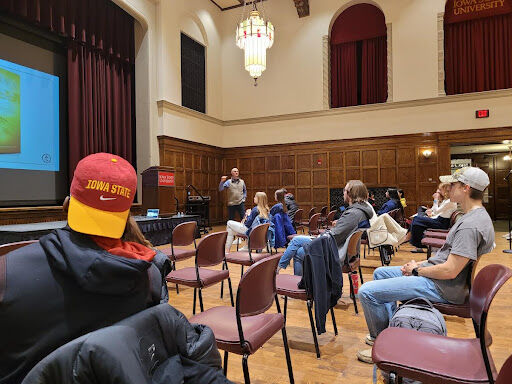ISU students learn “The Money Game”

Adam Carroll (center in the tan vest) presents his lecture on financial literacy and financial habits to students in the Great Hall of the Memorial Union.
April 20, 2022
After watching his children play Monopoly, Adam Carroll took the children’s game and turned it into a financial experiment.
He set up a game of Monopoly using real money and observed their game strategy. Each of his children played more conservatively and stopped sharing their money among themselves.
Adam Carroll is a financial literacy expert who has authored four books, presented two TED talks, created a documentary, founded www.MasteryOfMoney.com, contributed to the Huffington Post and spoken at over 750 colleges and universities. He gave a lecture to students on Wednesday entitled “The Money Game” in the Great Hall of the Memorial Union.
“He does a really good job of taking kind of the big, scary financial literacy atmosphere and kind of breaking it down into more manageable pieces,” said Isaac Ehlers of the Office of Student Financial Success, which was one of the co-sponsors of Carroll’s lecture. “He does a lot of good work explaining how [a] student can be financially literate, but then also building upon that and thinking about in the next five [to] ten years.”
The main focus of Carroll’s lecture was what he calls “the money game.”
“At any given point in time, you are all playing the game with money,” Carroll said. “You’re either winning or losing.”
The rules of the money game are simple, according to Carroll. There is an offense and defense that rely on financial habits, and each person plays both sides.
For a college student, the offensive side consists of things such as income, side hustles, scholarships, project work, asking for a raise and improving upon skills. The defensive side consists of activities like budgeting, couponing, living frugally, driving an old car, building savings, price shopping and making small shifts in spending while in school.
If a person can start making wise financial decisions on the offensive and defensive sides and keep with it, they will build strong financial habits that allow them to “win no matter what,” according to Carroll.
Carroll’s message resonated with Justine Jordahl, a senior majoring in agricultural business.
“I just learned a lot of good things,” Jordahl said. “A lot of people probably don’t have retirement on their mind at 18 to 20 years old, but just starting these two years early can really help us in the long run.”
Students can learn more about Carroll’s message at Need Help Getting Out of Debt? | Money Savvy (masteryofmoney.com).






